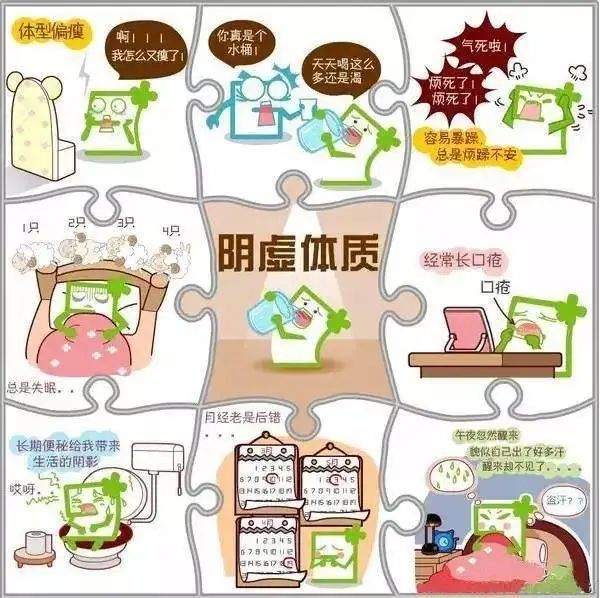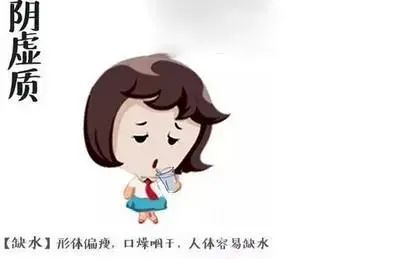
Yin Deficiency Constitution


She enjoys spicy food. She says that without chili, nothing tastes good. In my impression, her noodle soup is always red. She likes to drink water, saying that it is too dry here, and no matter how much she drinks, she still feels thirsty. Her menstruation is always irregular; when it finally arrives, it leaves quickly. She has tried various medications, but none seem to work, which makes her anxious and irritable.

Many girls in their twenties, like her, suffer from chronic constipation, insomnia, and often develop canker sores; their menstruation is frequently delayed, with scant flow, and they rarely part with their water bottles. They feel as if they have some illness, but when they go to the hospital, nothing significant is found. If your skin is dry and you crave water, it is highly likely that you have a Yin deficiency, indicating insufficient “jinye” (body fluids).

The Yin deficiency constitution is one of the nine constitutions. In fact, it is not only girls who exhibit Yin deficiency; an increasing number of people are showing symptoms of Yin deficiency. Individuals with a Yin deficiency constitution tend to be relatively thin, and one may notice a red flush on their cheeks. Those with Yin deficiency not only exhibit physical symptoms but also increasingly face psychological issues, such as insomnia, night sweats, irritability, and anger, which can lead to problems in marriage and social work. More and more people are realizing that their health is deteriorating, even becoming Yin deficient, but they do not know the reason. The causes of Yin deficiency can be divided into congenital and acquired factors.






Causes of Yin Deficiency Constitution



01
Congenital Factors
Congenital factors refer to the genetic inheritance from parents, which is beyond one’s control. If the mother has a poor constitution during pregnancy, is of advanced maternal age, has irregular menstruation, or if the child is born prematurely, these factors may lead to the child developing a Yin deficiency constitution.


02
Irregular Diet
The emergence of Yin deficiency may also be due to an irregular diet. Nowadays, people often lack dietary discipline, eating sporadically, favoring spicy foods, and consuming whatever they like without moderation, often mixing hot and cold foods without paying attention to dietary combinations, leading to poor gastrointestinal function, which can severely result in a Yin deficiency constitution. Therefore, it is essential to pay attention to dietary habits and food combinations.


03
Irregular Sleep Schedule
An irregular sleep schedule can also lead to a Yin deficiency constitution. It is recommended to go to bed early and rise early, avoid staying up late, and not to linger in bed, as this helps nourish the liver and kidneys, preventing excessive internal heat. Generally, those with irregular sleep patterns and who often stay up late are prone to developing a Yin deficiency constitution.


04 Excessive Mental Strain
In today’s fast-paced life, with busy work and high stress, people experience excessive mental strain, which, if not addressed in time, can lead to significant bodily depletion, making it easy to develop a Yin deficiency constitution.

 While congenital factors are unavoidable, acquired factors can be adjusted to prevent oneself from becoming Yin deficient. Therefore, it is crucial to pay attention to dietary habits and maintain a regular sleep schedule. Individuals with a Yin deficiency constitution primarily exhibit external signs of empty heat and internal deficiency of Yin fluids, commonly presenting with symptoms such as flushed complexion, hot palms and soles, night sweats, red tongue with little coating, dry mouth and throat, emaciation, and thin rapid pulse.Heart Yin deficiency can lead to irritability, palpitations, insomnia, and vivid dreams, increasing the risk of coronary heart disease, myocardial ischemia, myocarditis, and other cardiovascular diseases, or menopausal syndrome.Liver Yin deficiency may cause irritability, dry eyes, blurred vision, and subtle pain in the flanks, necessitating prevention of chronic cholecystitis, chronic viral hepatitis, and hypertension.Lung Yin deficiency presents with dry mouth and throat, blood-streaked sputum, dry skin, and night sweats, requiring early treatment to prevent chronic bronchitis, pneumonia, or even tuberculosis.Stomach Yin deficiency leads to thirst for cold drinks, good appetite but easy hunger, and dry stools. Those with these symptoms should monitor their blood sugar to prevent diabetes, and maintain a light and regular diet to avoid gastric ulcers and excessive stomach acid.Kidney Yin deficiency results in dizziness, tinnitus, weakness in the lower back and knees, tidal fever, tinnitus, loose teeth, hair loss, and irregular menstruation in women. It is essential to moderate sexual activity, maintain personal hygiene, and prevent urinary tract infections.
While congenital factors are unavoidable, acquired factors can be adjusted to prevent oneself from becoming Yin deficient. Therefore, it is crucial to pay attention to dietary habits and maintain a regular sleep schedule. Individuals with a Yin deficiency constitution primarily exhibit external signs of empty heat and internal deficiency of Yin fluids, commonly presenting with symptoms such as flushed complexion, hot palms and soles, night sweats, red tongue with little coating, dry mouth and throat, emaciation, and thin rapid pulse.Heart Yin deficiency can lead to irritability, palpitations, insomnia, and vivid dreams, increasing the risk of coronary heart disease, myocardial ischemia, myocarditis, and other cardiovascular diseases, or menopausal syndrome.Liver Yin deficiency may cause irritability, dry eyes, blurred vision, and subtle pain in the flanks, necessitating prevention of chronic cholecystitis, chronic viral hepatitis, and hypertension.Lung Yin deficiency presents with dry mouth and throat, blood-streaked sputum, dry skin, and night sweats, requiring early treatment to prevent chronic bronchitis, pneumonia, or even tuberculosis.Stomach Yin deficiency leads to thirst for cold drinks, good appetite but easy hunger, and dry stools. Those with these symptoms should monitor their blood sugar to prevent diabetes, and maintain a light and regular diet to avoid gastric ulcers and excessive stomach acid.Kidney Yin deficiency results in dizziness, tinnitus, weakness in the lower back and knees, tidal fever, tinnitus, loose teeth, hair loss, and irregular menstruation in women. It is essential to moderate sexual activity, maintain personal hygiene, and prevent urinary tract infections.
Author Profile

Yang Yanfeng, Deputy Director of the Rehabilitation Center, graduated from Henan University of Traditional Chinese Medicine. He is a member of the third and fourth sessions of the CPPCC in Zhoukou City, an executive director of the Zhoukou Rehabilitation Medical Association, chairman of the Pain Rehabilitation Branch of the Zhoukou Rehabilitation Medical Association, vice chairman of the Community (Grassroots) Rehabilitation Branch of the Zhoukou Rehabilitation Medical Association, and an executive member of the Acupuncture, Tuina, and Rehabilitation Committee of the Zhoukou Medical Association. He is also a member of the Rehabilitation Committee of Traditional Chinese Medicine for Bone Diseases in Henan Province. He was awarded the title of Advanced Individual in Aid to Xinjiang in 2014 and has received multiple honors as an “Advanced Worker” and “Outstanding Physician”.
Specializes in: Utilizing specialized TCM therapies such as small needle knife, blade needle, and acupoint injection to treat painful diseases, including periarthritis of the shoulder, lumbar disc herniation, lumbar spinal stenosis, ankylosing spondylitis, hip joint synovitis, knee joint synovitis, and sports injuries.
(Images sourced from the internet)
Editor: Yang Chenxi
Chief Editor: Li Qianping
Reviewer: Sun Jun







